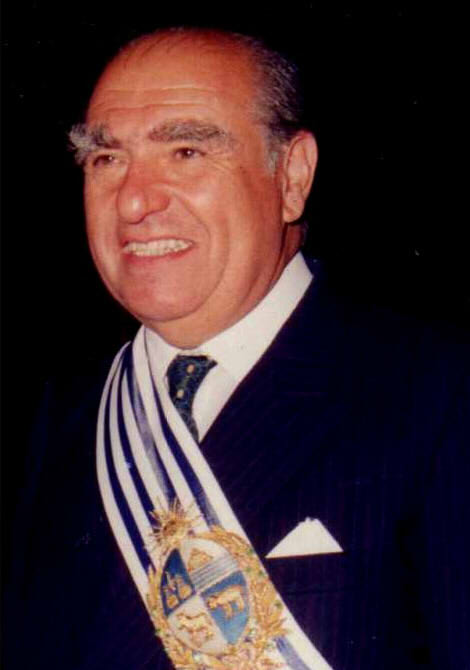Julio María Sanguinetti
 Julio María Sanguinetti Coirolo (; born 6 January 1936) often known by his initials JMS, is a Uruguayan former lawyer, journalist and politician of the Colorado Party (PC) who served as the President of Uruguay as the 35th president from 1985 to 1990, and again as the 37th president from 1995 to 2000. He was the first democratically elected president after twelve years of military dictatorship.
Julio María Sanguinetti Coirolo (; born 6 January 1936) often known by his initials JMS, is a Uruguayan former lawyer, journalist and politician of the Colorado Party (PC) who served as the President of Uruguay as the 35th president from 1985 to 1990, and again as the 37th president from 1995 to 2000. He was the first democratically elected president after twelve years of military dictatorship.Born in Montevideo, Sanguinetti graduated from the University of the Republic in 1961 with a law degree. He later combined his legal practice with work as a journalist. He had already been writing for the press, first in the weekly ''Canelones'' and later, since 1955, as a columnist for ''Acción'', a newspaper established by the then-President, Luis Batlle Berres, for which he covered events such as the Cuban Revolution and the OAS Foreign Ministers' summit that censured Cuba for its decision to establish relations with the Soviet Union.
In the 1962 general election, Sanguinetti was elected National Representative for the Montevideo Department, and re-elected in 1966. In 1969 the then president Jorge Pacheco Areco appointed him Minister of Industry and Commerce. From March to October 1972 he served as Minister of Education and Culture under Juan María Bordaberry. He publicly opposed the 1973 coup d'état and the subsequent civil-military dictatorship.
Sanguinetti participated in the Naval Club Pact that made the democratic transition possible. In the 1984 general election he was elected President of Uruguay as the most voted candidate of the most voted political party, according to the ''Ley de Lemas system''. Major government initiatives he undertook during his first term consisted of measures to disarm the previous regime, and included an amnesty law in favor of people who were still detained, convicted by military justice for political crimes and the Law on the Expiration of the Punitive Claims of the State. In foreign policy, Sanguinetti's government recognized and established diplomatic relations with the People's Republic of China, and signed the Alvorada Act, which added Uruguay to the regional integration process, which later led to the creation of the Southern Common Market. Provided by Wikipedia
